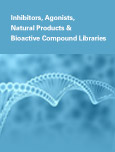Request The Product List ofApaf-1
Apaf-1
Apaf-1 is a central component in the apoptosis regulatory network for the treatment of apoptosis related diseases. Excessive Apaf-1 activity induced by myocardial ischemia causes cell injury.
A novel compound, ZYZ-488, exhibited significant cardioprotective property in significantly increasing the viability of hypoxia-induced H9c2 cardiomyocytes and reducing CK and LDH leakage, through interaction with Apaf-1 in procaspase-9 binding site. QM31 (SVT016426), a chemical inhibitor of Apaf-1, exerts mitochondria-protective functions while the direct interaction between QM31 and Apaf-1 was not clearly defined, decreases Cytc release and apoptosome-mediated activation of procaspase-9 preventing cell and tissue damage in ex vivo experiments and in vivo animal models of apoptotic damage.
Apaf-1 pharmacological inhibition has therapeutic potential for the treatment of apoptosis-related diseases.
References:
1. Wang Y, et al. The discovery of a novel inhibitor of apoptotic protease activating factor-1 (Apaf-1) for ischemic heart: synthesis, activity and target identification. Sci Rep. 2016 Jul 22;6:29820. doi: 10.1038/srep29820.
2. Malet G, et al. Small molecule inhibitors of Apaf-1-related caspase- 3/-9 activation that control mitochondrial-dependent apoptosis. Cell Death Differ. 2006 Sep;13(9):1523-32.
3. Imao T, et al. Apaf-1- and Caspase-8-independent apoptosis. Cell Death Differ. 2013 Feb;20(2):343-52.
4. Mondragón L, et al. A chemical inhibitor of Apaf-1 exerts mitochondrioprotective functions and interferes with the intra-S-phase DNA damage checkpoint. Apoptosis. 2009 Feb;14(2):182-90. doi: 10.1007/s10495-008-0310-x.
5. Orzáez M, et al. Apaf-1 inhibitors protect from unwanted cell death in in vivo models of kidney ischemia and chemotherapy induced ototoxicity. PLoS One. 2014 Oct 20;9(10):e110979.













